Iraqi forces yesterday fought to eliminate the last pockets of Islamic State (IS) group resistance in Mosul after the prime minister visited the city to congratulate troops on securing victory.
With the militants surrounded in Mosul’s Old City, attention was turning to the huge task of rebuilding the city and of helping civilians, with aid groups warning that the nation’s humanitarian crisis was far from over.
Iraqi Prime Minister Haider al-Abadi visited Mosul on Sunday and hailed Iraq’s “heroic fighting forces” after months of difficult battles that have left much of the city in ruins.
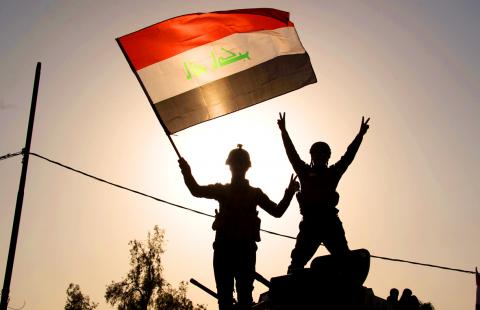
Photo: AFP
Upon his arrival, al-Abadi’s office said he was visiting “liberated” Mosul to congratulate troops on a “major victory.”
He later said that while “victory is certain,” he was holding off on making a formal declaration “out of my respect and appreciation for our ... forces that are continuing the clearing operation.”
A senior commander yesterday said that Iraqi forces were engaged in “heavy” fighting with the remnants of militants, but that the battle was near its end.
The cost of victory has been enormous: much of Mosul in ruins, thousands dead and wounded and nearly half the city’s population forced from their homes.
The UN has said that 920,000 people fled their homes during the Mosul operation, and while some have returned, the vast majority remain displaced.
“The fighting may be over, but the humanitarian crisis is not,” UN humanitarian coordinator for Iraq Lise Grande said in a statement.
The UN Human Rights Council yesterday said it could be many months before civilians are able to return to their homes.
“It is likely that thousands of people may have to remain in displacement for months to come,” the council said in a statement.
“Many have nothing to go back to ... while key basic services such as water, electricity and other key infrastructure, including schools and hospitals, will need to be rebuilt or repaired,” it said.
Twenty-eight aid groups issued a statement calling for international support for rebuilding efforts and urged authorities not to press civilians to return.
“Remaining insecurity; lack of basic services; explosive hazards contamination; and damage to homes, businesses and public infrastructure — including schools and hospitals — all continue to pose barriers to return,” the statement said.
It also raised concerns for Iraqis still in areas under IS control, including the towns of Tal Afar and Hawijah in the north, and territory in Anbar Province.
“For the expected offensives in Hawijah, Tal Afar and western Anbar, where approximately 150,000 civilians are thought to still be trapped, it is vital that lessons are learnt from pass offensives,” the aid groups said, calling for access to safety and assistance to be prioritized.
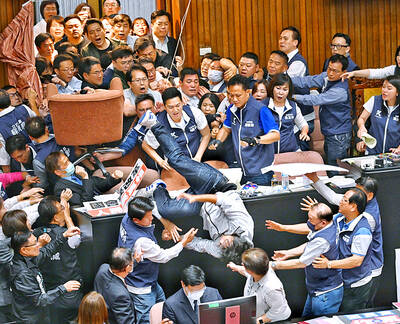
MUSICAL INTERLUDE: During the altercations, KMT Legislator Hsu Chiao-hsin at one point pulled out a flute and started to play the national anthem A massive brawl erupted between governing and opposition lawmakers in the main chamber of the legislature in Taipei yesterday over legislative reforms. President-elect William Lai (賴清德) is to be inaugurated on Monday, but his Democratic Progressive Party (DPP) lost its majority in the legislature and the Chinese Nationalist Party (KMT) has been working with the Taiwan People’s Party (TPP) to promote their mutual ideas. The opposition parties said the legislative reforms would enable better oversight of the Executive Yuan, including a proposal to criminalize officials who are deemed to make false statements in the legislature. “The DPP does not want this to be
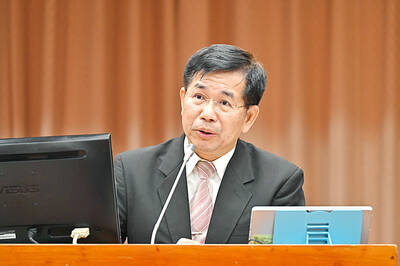
The International Industrial Talents Education Special (INTENSE) Program to attract foreigners to study and work in Taiwan will provide scholarships and a living allowance of up to NT$440,000 per person for two years beginning in August, Minister of Education Pan Wen-chung (潘文忠) told a meeting of the legislature’s Education and Culture Committee yesterday. Pan was giving an update on the program’s implementation, a review of universities’ efforts to recruit international students and promotion of the Taiwan Huayu Bilingual Exchanges of Selected Talent (BEST) program. Each INTENSE Program student would be awarded a scholarship of up to NT$100,000 per year for up to
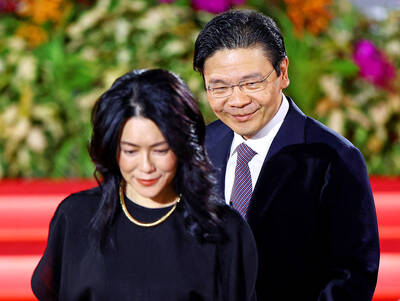
Singapore yesterday swore in Lawrence Wong (黃循財) as the city-state’s new prime minister in a ceremony broadcast live on television after Lee Hsien Loong (李顯龍) stepped down following two decades in office. Wong, formerly deputy prime minister, was inaugurated at the Istana government office shortly after 8pm to become the second person outside the Lee family to lead the nation. “I ... do solemnly swear that I will at all times faithfully discharge my duties as prime minister according to law, and to the best of my knowledge and ability, without fear or favor, affection or ill-will. So help me God,” the
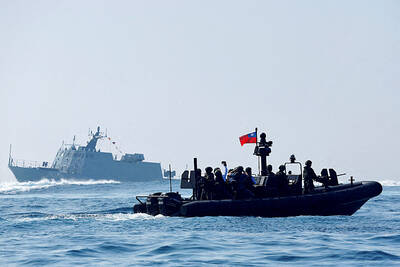
BASIC OPERATIONS: About half a dozen navy ships from both countries took part in the days-long exercise based on the Code for Unplanned Encounters at Sea An unpublicized joint military exercise between Taiwan and the US in the Pacific Ocean last month was carried out in accordance with an international code, the Ministry of National Defense (MND) said yesterday. According to a Reuters report citing four unnamed sources, the two nations’ navies last month conducted joint drills in the Western Pacific. The drills were not made public at the time, but “about half-a-dozen navy ships from both sides, including frigates and supply and support vessels, participated in the days-long exercises,” Reuters reported, citing the sources. The drills were designed to practice “basic” operations such as communications, refueling and resupplies,